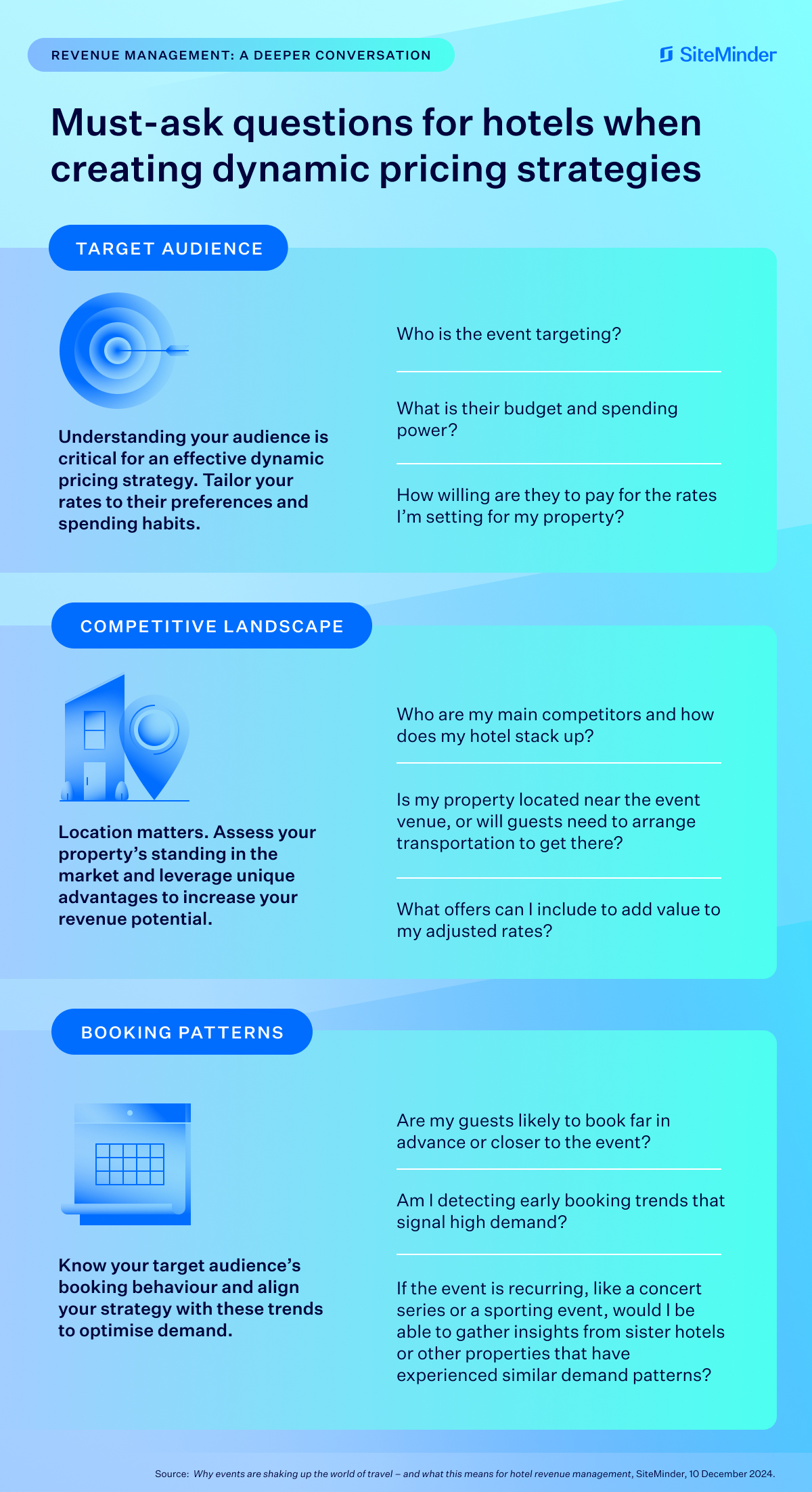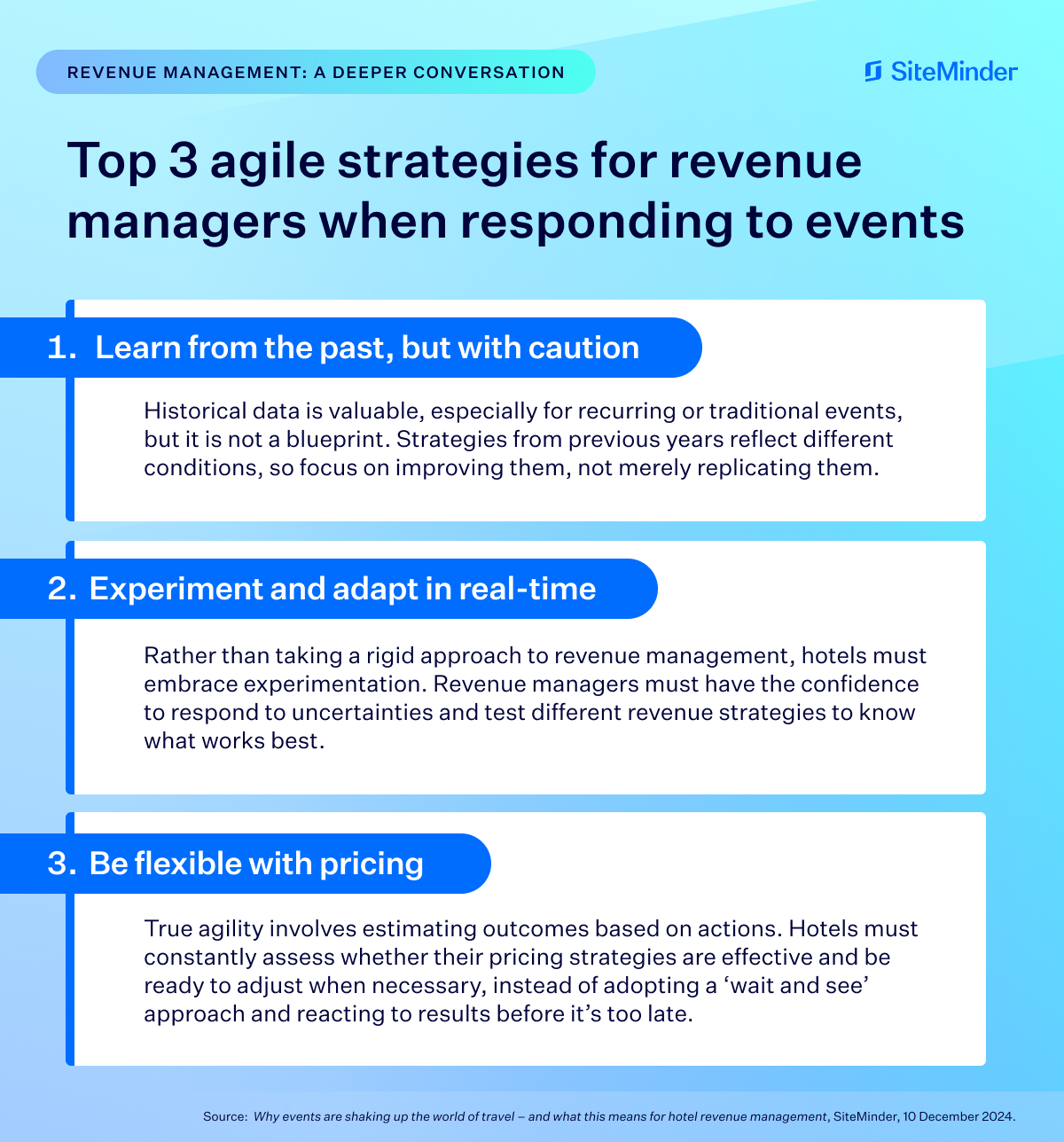The wave of live performance bulletins by worldwide music acts this 12 months has stirred pleasure not simply amongst followers, however hoteliers. The mad rush for tickets to see the likes of Coldplay, Oasis and Kylie Minogue has triggered a pointy demand for lodge rooms wherever these artists are performing. And, this phenomenon has prolonged past live shows. Main public gatherings just like the photo voltaic eclipse viewing within the US and sporting occasions just like the UEFA Euro in Germany have additionally drawn vital consideration to inns, as native and worldwide travellers flock to attend these occasions.
Occasion-driven journey is undeniably booming, with its affect seen in lodge occupancy and room charges. As Allied Market Analysis stories, the worldwide occasions business is projected to achieve US$2 trillion by 2032 – practically doubling its 2019 measurement of US$1.1 trillion – suggesting that occasions are set to turn into an much more vital income supply for the hospitality business.
Whereas occasions have lengthy been a dependable driver of lodge bookings, their rising significance within the hospitality business is now being pushed by shifting dynamics of provide and demand. As Fabian Bartnick, Founding father of income administration options Infinito and PerfectCheck, factors out: “All people is now trying to monetise occasions … and somebody is controlling their provide.” In different phrases, key gamers – be it governments, airways or occasion organisers – now play a vital position in deciding when, the place and the way occasions occur and are made out there, typically creating shortage amid rising demand.

Citing the Singapore leg of Taylor Swift’s Eras Tour for instance of managed shortage, Bartnick explains how the native authorities successfully managed the provision of Swift’s live performance in Southeast Asia by securing an unique contract with the artist, creating a novel market the place the occasion’s restricted availability enabled different enterprise sectors to cost larger costs.
“You and I’d suppose $700 for a ticket is loopy,” says Bartnick. “However in case you are a Swifty dwelling in Thailand or the Philippines and have the possibility to see her in your yard, you’re going. So, your entire spectrum of income administration that’s occurring [for events] has widened from simply ticket gross sales. Airways and inns have capitalised on the development.”
Altering attitudes to journey
The rise of occasion journey can also be intently linked to the inflow of travellers arriving en masse at these occasions, as seen with Swift’s tour. Bartnick notes that this shift factors to a deeper change in attitudes in direction of journey, the place customers are more and more prioritising life-enriching experiences.
“After Covid, there was a elementary shift in what it truly means to have a sure type of freedom, to have a sure skill to journey, see the world and do one thing,” he explains.
Moreover, with journey changing into extra accessible, extra individuals are selecting to journey for occasions just because they now can. Pablo Torres, hospitality advisor and founding father of Torres Consulting, explains: “It’s not simply that extra occasions are occurring. It’s additionally as a result of extra individuals can now afford to attend them.”
Maximising demand by means of dynamic pricing
The management of occasion provide by a handful of key gamers, mixed with a public extra wanting to journey than ever, has pushed inns to show to expertise to seize this demand successfully. Income administration options providing market intelligence have been indispensable, and the necessity is obvious; inns should depend on instruments that enable them to maintain observe of demand round the clock, particularly for occasions attracting a extra world viewers.
“No human, no matter their expertise or ability, can suppose quicker than a machine,” says Torres. “There are instruments available on the market that already present, for instance, the rise in searches and flights to your vacation spot, demand for bookings and the occasions you may need in your metropolis. You might try this manually and spend your entire day compiling the data, or you possibly can press a button and have a dashboard in your display after which resolve.”
With this data, improvements in lodge tech have given properties the boldness to enterprise into dynamic pricing, a technique through which inns regulate room charges each day or inside the day primarily based on real-time demand, permitting them to maximise occupancy and income throughout occasions. This technique has turn into ubiquitous throughout industries – from airways to supply apps – and, as Klaus Kohlmayr, Chief Evangelist and Growth Officer at IDeaS, suggests, it’s excessive time that lodge income managers embrace it totally, now that buyers are extra conversant in the idea. Certainly, SiteMinder’s Altering Traveller Report 2025 signifies that greater than 6-in-10 travellers globally agree that inns ought to be capable to regulate their charges throughout peak demand durations.
“Relying on the kind of lodge, you might see measurable income uplift simply by adopting dynamic pricing,” Kohlmayr explains. “From a shopper standpoint, dynamic pricing means that you can pay a decrease price when demand is low, [in the same way] that you just settle for paying a better price when there may be excessive demand. Shoppers have been educated on that and so they perceive that [this strategy] occurs in companies all around the world.”
Avoiding the pitfalls of value gouging
However regardless of the revenue-generating benefits that dynamic pricing provides, it typically attracts scrutiny. Sure ride-sharing providers have come underneath hearth for value surges throughout public emergencies, whereas ticketing corporations have confronted backlash for dramatically inflating costs in response to high-demand occasions in current months. These cases have induced the road between honest value changes and unethical value gouging to blur.
Shannon Knapp, Founder and Director of lodge consultancy SKNapp Consulting, says: “Dynamic pricing is getting an unfair dangerous rap. A elementary flaw in retail business functions of dynamic pricing or demand-based pricing is after they don’t institute a cap or a ‘ceiling’ value level the way in which we do in inns, in order to forestall costs capturing as much as eleventy jillion {dollars} when Taylor Swift or Oasis broadcasts dates. The perfect lodge income administration programs have configurable ceiling settings to forestall this.”
Knapp provides: “In the case of dynamic pricing, income managers want to recollect: value gouging is exploitative and takes benefit of drawback, particularly throughout crises. Whereas value optimisation adjusts charges in response to high-demand leisure occasions with a ceiling price configured to make sure accountable software.”
This highlights the necessity for a considerate and data-based method to pricing, slightly than merely reacting to fluctuating demand. Worth changes shouldn’t solely reply to market circumstances but additionally contemplate how visitors understand the equity and worth of the charges provided. In brief, dynamic pricing isn’t nearly setting costs.
“Sadly, the ability set that we now have within the business thinks that dynamic pricing is like enjoying yo-yo by letting costs go up and down,” shares Bartnick. “Dynamic pricing is a tactical lever with many sides at play. We have to perceive how our charges impression pricing energy, and our gross sales and advertising and marketing efforts.”

Worth-driven technique
Bartnick provides that the ‘lifetime worth of a buyer’ should even be factored in when finishing up dynamic pricing for occasions, retaining in thoughts loyal, repeat clients and even visitors from account-based shoppers. Balancing dynamic pricing for occasion clients with these long-term relationships permits inns to seize fast income with out risking future enterprise from high-value visitors.
Importantly, on the core of dynamic pricing is the worth inns can supply to visitors past the room. Whereas income managers could have the pliability to regulate their charges as soon as vital demand from occasions is detected, their pricing methods ought to be paired with significant choices that present actual worth for cash.
Torres explains, “In case your solely supply is identical room that price 20 occasions much less the day earlier than, most clients will discover it unfair. Why don’t you embrace added worth? You possibly can create a bundle with the live performance organisers, embrace transfers to the venue the place the occasion is going down or embrace breakfast. Add worth in your pricing that visitors will discover significant, in order that they really feel they’re getting a good value.”

Agility at a time of uncertainty
The rise of occasion journey indicators a future that can solely see extra demand-driving developments impacting inns, now that “the macroeconomic elements for hospitality and tourism are very optimistic”, Kohlmayr factors out. “There are 100 million individuals yearly which might be coming into the center class. In the event you’re within the lodge enterprise, it’s a must to take into consideration the long term alternatives to faucet into that.” This aligns with findings from SiteMinder’s Altering Traveller Report 2025, which reveals that 72% of travellers globally might be travelling internationally in 2025, and that the majority (92%) plan to spend not less than the identical quantity or extra on their lodging.
Nonetheless, as journey turns into much more dynamic, the business is predicted to function in an more and more unsure setting. On this regard, Bartnick emphasises that income managers need to be extra comfy with the uncertainty introduced by rising journey developments.
And, all of it begins with agility.
“Agility is the secret. We now have a sport the place we don’t actually know who’s enjoying or what the principles are. Airways have turn into actually good at controlling provide of flights, very like how the Singaporean Authorities managed to regulate Taylor Swift’s tour location. In lots of cases, inns might be on the receiving finish of those shifts. Some elements are exterior your energy, but when they occur to be coming your means, then it’s a must to be quick sufficient to monetise,” he says.

Income managers should then be extra reflective about their methods, significantly for unpredictable, high-demand occasions. Fairly than relying solely on historic knowledge or going by a inflexible ‘wait and see’ method, altering pricing selections when it’s too late, they should set expectations even earlier than they set their income methods and recurrently re-evaluate their selections.
“We’re not trigger and impact for the time being when setting dynamic pricing methods,” notes Bartnick. “We don’t suppose forward – that if I throw a ball at a sure velocity, it’ll come again in a particular spot.”
He provides, “That’s why we have to do [away with] that elementary, inflexible mindset in income administration and turn into extra agile, extra experimental. Nothing is created within the consolation zone. Income administration itself is a subject of experimentation.”
